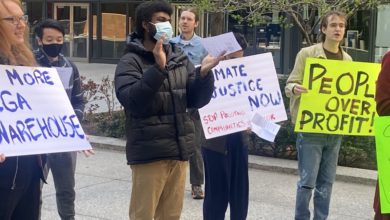The undemocratic nature and inefficiency of capitalism becomes ever more apparent in California’s drought crisis. As the state attempts to create a law regulating ground water use, agribusiness is fighting back. As usual under capitalism, the long term protections of the environment and the needs of society as a whole are sacrificed for the profits of a few.
Instead of focusing on solutions, the state is concerned, and understandably so, with the tidal wave of lawsuits that are sure to come from the agriculture sector if any binding legislation is passed. When King County Supervisor Doug Verboon suggested restrictions on new well drilling, he was answered by a local farmer with, “Can you afford a bodyguard?”
This is the insanity of the right to “private property” that puts the rights of individual land owners over the needs of the entire community, and in the long run, the very survival of our species. These contradicting interests can never be reconciled under the capitalist model as its very foundations are built on dog-eat-dog competition instead of cooperation.
As you drive through California’s Central Valley, you may get the sense that the government is making poor environmental protection choices if you come upon a “Farm Facts” highway banner, such as “The Right Crops, The Right Place” and “1.2 Million California Jobs Depend on Agriculture.”
The funders of these billboards have ties to the Tea Party and climate change denier Congressman Devin Nunes (R) whose top campaign contributors are American Pistachio Growers, Blue Diamond Growers and the Wine Institute. Not a surprise, as most climate change deniers have the financial backing of corporations that benefit from business-as-usual plunder.
The billboards imply that there is no problem with continuing to grow water intensive crops such as almonds in the midst of a drought, and that the economy depends on it. But what happens to those 1.2 million jobs when the aquifer, which took tens of thousands of years to accumulate, runs dry? What happens when the largely low wage immigrant families who work the fields, don’t have running water in their homes and can’t afford to have their water trucked in?
The billboards are purely propaganda to subvert the facts which threaten the profits of agribusiness. The funders of the campaign don’t care about the living conditions of their workers much less the long term health of the ecosystem of the Central Valley. Thousands of families in the Central Valley have already been without water for months as Liberation News documented in August.
There are many ways to make changes in agriculture to conserve water, such as curbing the current practice of overproduction and production for export. Nearly 15% of California crops are grown for export while 40% of food produced in the U.S. is thrown away because it cannot be sold at a profit.
With centralized planning based on society’s needs, production could be scaled back and we could still have enough food for everyone. In the face of climate change, the world needs to role back the free trade agreements that have undermined local agriculture and instead of shipping of goods across the world so one sector can profit, when possible, grow locally what is needed for that region.
If we lived in a socialist system, there would be cooperation between the community, farmers and drought experts to solve the crisis. There would be a shift from water intensive crops to drought resistant ones because profits would not determine what is grown. There could be polyculture organic practices implemented which help preserve the soil nutrients and retain more moisture. Everyone would be guaranteed a job and there would be a retraining and shifting of jobs from agriculture to other industries if agricultural jobs needed to be cut.
In socialist Cuba, a country faced with increasing hurricanes and droughts as a result of climate change, they are planting more drought resistant crops such as yucca and plantain and low growing plants such as squash, malanga and sweet potatoes, which stay anchored in high winds. Cuba’s National Institute of Tropical Food Research has developed a gene reservoir with hundreds of varieties of different crops which can be cross bred to adapt to climatic changes. Unlike capitalist solutions like Monsanto’s drought resistant GMO seeds—a risk to human health and the ecosystem—Cuba uses natural, sustainable methods and new seed varieties are provided to all farmers instead of sold on the market to those who can afford it with data kept secret by patent rights.
Many of the seemingly insurmountable environmental crises we face can be solved under a socialist system, where the rights to private property and profit are eliminated and society can pool knowledge and resources to meet the needs to all.






